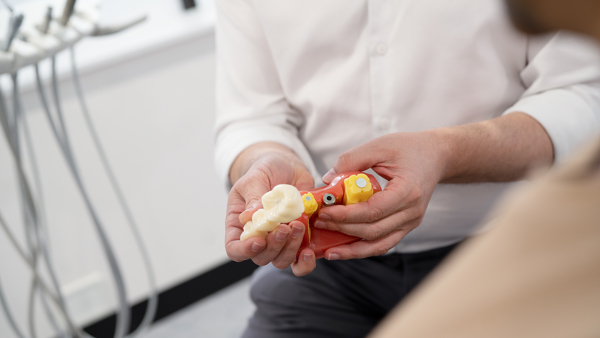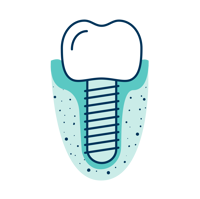Living with missing teeth isn’t ideal. It’s good to know that it's something that can be addressed.
Replacing your tooth or teeth can help to enhance your smile - and your confidence. It may also improve how you chew and speak. There are a number of ways missing teeth can be restored. These include dental implants, mini implants, fixed bridges, removable or implant dentures. Talk with your dentist about the options available.


Dental implants
If you need to replace a single tooth or if you’re missing several teeth in different areas of your mouth, a dental implant might be the right option for you. It provides a permanent base for a replacement tooth.
With this treatment, an implant or screw is surgically placed into your jaw and a replacement crown is placed on top of the implant. It looks like a natural tooth and can last for many years. An implant shouldn’t affect any of the surrounding teeth.

Implant dentures
While regular dentures rest on the gums, implant dentures are replacement teeth that are supported by - and attached to - implants in your jaw. This treatment is used if there aren’t any teeth in the jaw but there is enough bone in the jaw to support the implants.
Fixed bridge
If you’re missing one or more teeth in the same area, a fixed bridge might work for you. As the name suggests, this solution bridges a gap from a missing tooth.
An artificial tooth is supported by the surrounding natural teeth and bonded to these with dental cement. A dental bridge looks and feels like natural teeth.
Get prepared
When you book at one of our dental practices to discuss a missing tooth or teeth, you want to get it sorted quickly and understand your options. That’s understandable. It’s useful to think ahead about what your dentist will need to know to asses and treat your situation.
Generally your dentist will ask you about your medical history and then thoroughly examine your mouth, teeth, gums, jaw, tongue, throat, sinuses, ears, nose and neck. You may also need an x-ray, depending on your situation.
Your dentist may ask you some questions about your missing tooth such as:
- How long has it been like this?
- Are you experiencing any pain?
- Does it affect how you eat or drink?
Think about your answers to these questions before your appointment. Being prepared can speed up the diagnosis.
Have questions?
The price of assessing and replacing a missing tooth or teeth depends on a few things. These include where in your mouth the tooth or teeth are missing, why they are missing and the potential problems that could develop. We recommend that you see a dentist to check it out thoroughly. Your dentist will be able to advise you about the cost of any treatment. When you book online, simply select an appointment for missing teeth.
Sometimes, having a missing tooth or teeth has little impact. Depending on where in your mouth it is missing, it might not even be noticeable. But your teeth are designed to work together in a certain way. So a missing tooth or teeth might alter or impair the way you speak and eat. Over time, it may develop into a serious problem. If you compensate for a missing tooth in the way you use your mouth, your jaw and facial muscles may be affected. Missing teeth may alter the shape of your face over time. The best thing is to talk to your dentist early to discuss your options and to get your dentist’s advice on any problems that may develop.
By adulthood, most of us have a full set of 32 teeth. By middle-age, around 45 to 65 years old however, many of us will have a missing tooth or teeth. This is generally due to gum disease, or periodontitis, tooth decay and injury. Every one of your 32 teeth plays an important role. They help to chew and eat, to speak clearly and of course to complete your smile. Teeth are also important in retaining the structure of your mouth and shape of your face. If one or more teeth are missing, these functions can be impaired. Talk to your dentist about your situation and the potential solutions.
Get to a dentist as soon as you can. If you can’t get to an emergency dentist, go to the emergency department at the hospital. If you lost your tooth in an accident, do try to find the tooth and bring it with you. Your dentist will assess the situation and aim to treat you as soon as possible.
If you have had an accident, injury or blow to the face or head and have loose teeth, see your dentist as soon as possible. They will be able to assess your teeth and discuss what treatment they recommend. There may be no treatment required. But if a loose tooth isn’t seen to, there is a risk that the tooth may die or fall out later on.
Toddlers and children lose their baby teeth naturally as the adult teeth grow. This generally starts happening at around age six - and sometimes earlier. If your child loses one of their baby teeth in an accident, visit your dentist or emergency doctor as soon as you can. Baby teeth can’t be replaced, but your dentist or emergency doctor will assess the situation and discuss with you what the best treatment is.
We get it. We’re New Zealand’s largest group of dentists so we’ve seen more scared patients than any other dental practice in the country. For most people who are scared about visiting the dentist it’s because they’ve had a bad experience in the past. Relax. Our gentle and compassionate dentists understand how you feel. Whether you’re anxious or worried about experiencing more pain or the potential cost of the treatment, the best thing to do is to let us know how you feel. Making sure you feel comfortable is part of our job.
Sometimes it’s just out of our control. Accidents and injuries do happen. But when it comes to gum disease and decay as causes of missing teeth, there are things you can do. The big one is taking good care of your oral health. That means a combination of at-home dental care and building a great relationship with your dentist.
We recommend daily healthy habits and regular visits to the dentist. For optimum oral health:
- Practice good oral hygiene habits at home including brushing your teeth twice a day and flossing once a day
- Book hygiene visits with an oral hygienist or oral health therapist twice each year
- Book routine exam and x-rays visits with your dentist once each year
The Lumino Dental Plan is a cost-effective way to ensure your oral health is given the priority it deserves. It’s an affordable ongoing subscription plan that keeps you on top of your oral health. We know that when you look after your oral health properly with regular preventative care, you’ll be less likely to need to see a dentist in an emergency. You’re also likely to spend less money at the dentist over time.
What next
Learn more about what's next by viewing some possible treatments. We recommend you book an appointment with a dentist for specific advice about your symptoms. You can search for your nearest practice and book online today.



